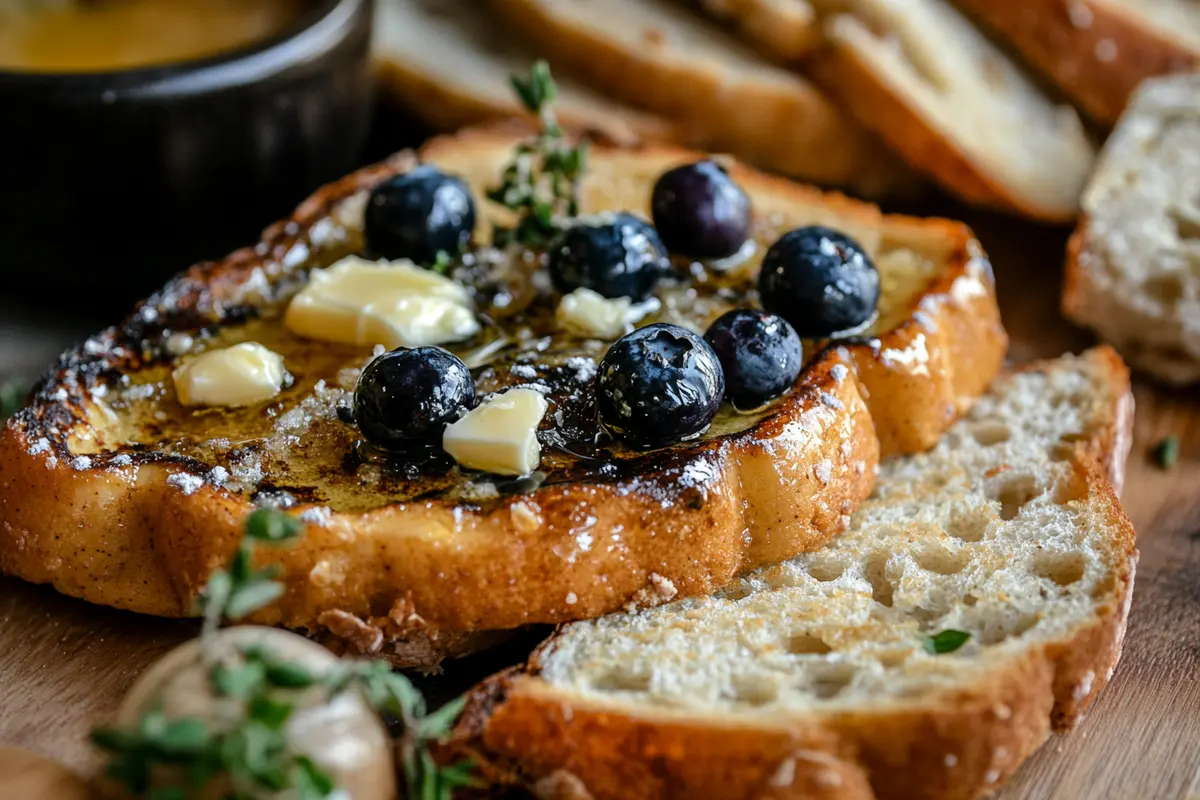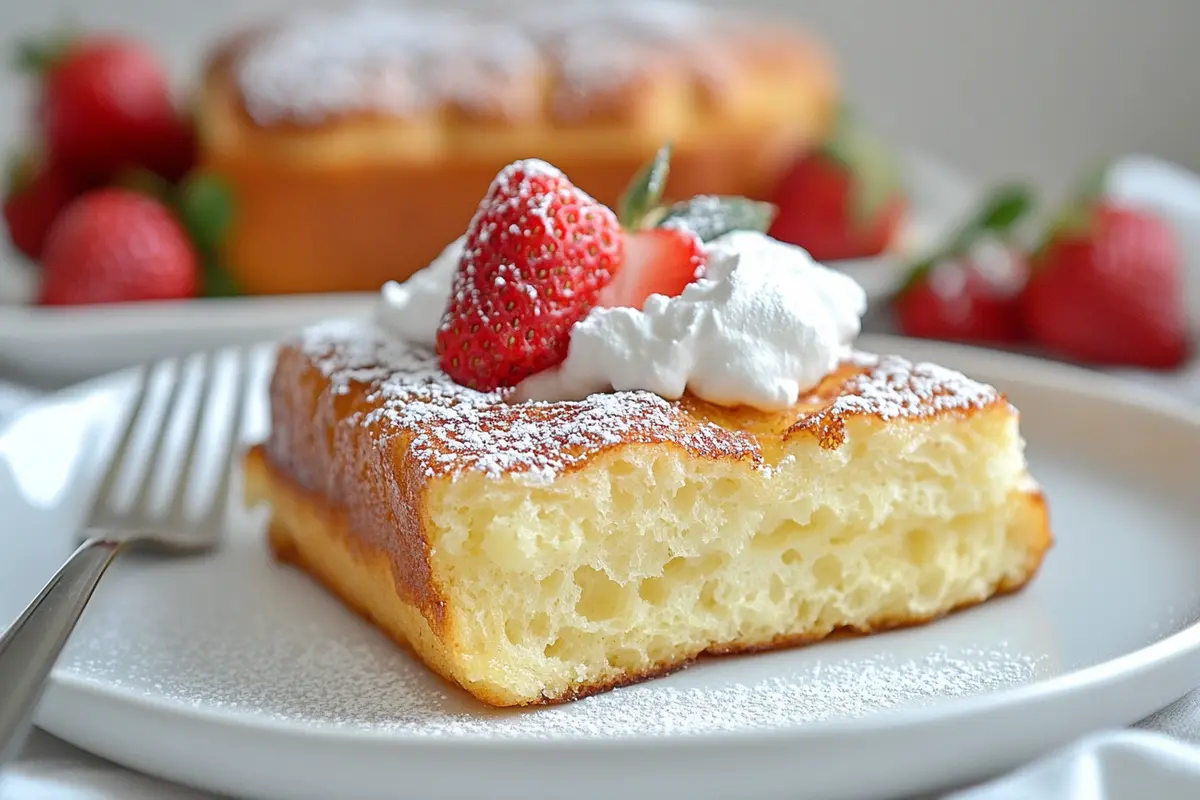Introduction :
French toast has long been a breakfast favorite, combining the simplicity of bread with the richness of custard for a deliciously indulgent dish. But when it comes to choosing the best bread for French toast, the debate often centers on sourdough and brioche. Each has its unique qualities, and the choice largely depends on personal preference, the desired flavor profile, and how you plan to serve it.Is sourdough or brioche better for French toast?
In this article, we’ll delve into what makes sourdough and brioche popular choices, compare their features, and guide you in making the ultimate French toast. Whether you’re a fan of sourdough’s tangy charm or brioche’s buttery sweetness, you’re about to discover which one might take your French toast game to the next level. Let’s dive in!
What Makes a Great French Toast?
French toast is all about texture, flavor, and a perfect balance between crispy edges and soft, custardy centers. The bread plays a critical role in achieving these elements. A great French toast must soak up the custard without becoming too soggy and should brown beautifully on the griddle or pan.
The Role of Bread in French Toast Quality
Bread isn’t just a base; it’s the heart of the dish. The right bread can elevate your French toast from ordinary to unforgettable. The texture, thickness, and flavor of the bread all contribute to the final product. For example, denser breads like sourdough offer a chewy, robust bite, while softer breads like brioche provide a delicate, melt-in-your-mouth experience.
Why Sourdough and Brioche Are Popular Choices
Sourdough and brioche dominate the French toast world for good reason. Sourdough’s tangy flavor adds depth and complexity, making it ideal for those who enjoy a savory edge. Meanwhile, brioche’s buttery richness lends itself to sweet, decadent variations of the dish. Both breads are sturdy enough to withstand soaking in custard, ensuring they hold their shape while cooking.
By understanding the qualities of these two breads, you can better decide which one aligns with your French toast goals. Ready to explore them in depth? Let’s move on!
Sourdough for French Toast

Characteristics of Sourdough Bread
Sourdough bread stands out for its distinct tangy flavor and chewy texture. Made through a fermentation process using wild yeast and bacteria, it develops a natural complexity that appeals to adventurous taste buds. This bread typically has a denser structure and a hearty crust, making it ideal for holding up during the soaking and cooking stages of French toast preparation.
Why Sourdough Works Well for French Toast
Sourdough is a fantastic choice for those who enjoy a savory twist in their sweet dishes. Its tangy flavor complements the richness of the custard, creating a balanced taste. Additionally, sourdough’s firm texture prevents it from becoming overly soggy during soaking, ensuring a perfect bite every time. If you’re still wondering, “Is sourdough or brioche better for French toast?”, sourdough wins for those seeking a robust, hearty option.
Potential Drawbacks of Using Sourdough
Despite its many advantages, sourdough isn’t for everyone. Its tangy taste might overpower sweeter toppings like maple syrup or powdered sugar. Moreover, its thicker crust can be challenging to crisp evenly, especially for those new to making French toast. Finally, sourdough’s dense crumb can sometimes take longer to absorb the custard mixture, requiring extra patience during preparation.
How to Prepare Sourdough for French Toast
To make the best French toast with sourdough, start by slicing the bread thickly—about ¾ to 1 inch is ideal. Stale or slightly dry sourdough works best, as it absorbs custard without falling apart. Let the bread soak for a few minutes to ensure the custard penetrates the dense crumb. Cook on medium heat to crisp the crust while preventing the center from drying out.
Brioche for French Toast

Characteristics of Brioche Bread
Brioche is a soft, buttery bread enriched with eggs and milk, giving it a rich, slightly sweet flavor. Its light, fluffy texture makes it a standout for indulgent French toast. The golden crust is delicate yet sturdy enough to withstand soaking, making brioche a go-to for traditional French toast recipes.
Why Brioche Is a Favorite for French Toast
Brioche is perfect for anyone who loves a decadent breakfast. Its natural sweetness enhances the custard’s flavor, and its airy texture absorbs the mixture effortlessly. When cooked, brioche develops a golden-brown crust while staying pillowy soft inside. For those asking, “Is sourdough or brioche better for French toast?”, brioche shines for its luxurious, dessert-like qualities.
Potential Drawbacks of Using Brioche
Despite its appeal, brioche does have some downsides. Its light texture means it can sometimes become too soft or fall apart if soaked too long. Additionally, its rich flavor might overshadow simpler toppings or savory accompaniments. Brioche is also slightly more expensive and harder to find than sourdough, which may limit its accessibility for some.
How to Prepare Brioche for French Toast
To make the most of brioche, slice it thickly—around 1 inch per slice. Fresh brioche works well, but slightly stale bread will absorb the custard more evenly. Because brioche is so tender, handle it gently during soaking and cooking. Use medium-low heat to avoid burning the buttery crust and ensure the center remains soft and custardy.
Head-to-Head Comparison: Sourdough vs. Brioche
Texture and Flavor Differences
When comparing sourdough and brioche for French toast, texture and flavor are key differentiators. Sourdough is dense with a chewy crust, making it perfect for those who enjoy a hearty bite. Its tangy flavor stands out, especially when paired with savory toppings like crème fraîche or cheese. On the other hand, brioche offers a soft, buttery texture and a mildly sweet flavor, creating a dessert-like experience when paired with sweet toppings like maple syrup or fresh fruit.
Absorption of Custard Mixture
Absorption is crucial for the perfect French toast. Sourdough’s dense crumb takes time to soak up the custard, but this ensures it doesn’t fall apart during cooking. Conversely, brioche absorbs custard almost instantly, making it easy to prepare but prone to becoming overly soft if soaked too long. So, when asking, “Is sourdough or brioche better for French toast?”, the choice may depend on your patience and cooking style.
Suitability for Different Toppings
Each bread shines with different toppings. Sourdough’s tangy flavor complements savory accompaniments like smoked salmon or herbed butter. Brioche, with its sweet profile, pairs beautifully with whipped cream, powdered sugar, or chocolate drizzle. The versatility of these breads means there’s something for every palate.
Nutritional Comparison
Nutritionally, sourdough is often considered healthier due to its fermentation process, which can aid digestion and reduce gluten content. Brioche, though delicious, is richer in fat and calories due to its buttery, eggy base. If health is a consideration, sourdough might be the better option.
Which is Better for Specific Occasions?
If you’re serving French toast for a decadent brunch or dessert, brioche is a showstopper. For casual breakfasts or when pairing with savory sides, sourdough holds its own. Ultimately, the answer to “Is sourdough or brioche better for French toast?” depends on your flavor preferences and occasion.
For more creative ideas on using sourdough, check out this sourdough French toast recipe from Deluxe Recipes!
Tips for Making the Best French Toast with Any Bread
Choosing the Right Bread Based on Your Preferences
The first step in perfecting French toast is choosing the right bread. If you crave a rich, dessert-like dish, brioche is ideal. For a savory or slightly tangy twist, sourdough is a winner. Both options work well, but it’s important to consider your toppings and serving style.
Perfecting the Custard Mixture
A well-balanced custard is essential for great French toast. Combine eggs, milk (or cream), sugar, and a splash of vanilla extract for a classic base. For added depth, cinnamon or nutmeg can be included. Adjust the sugar based on whether you’re using sourdough or brioche, ensuring the flavors harmonize with the bread’s profile.
Cooking Techniques for Golden-Brown French Toast
The secret to achieving golden-brown French toast lies in your cooking method. Preheat a non-stick skillet or griddle over medium heat and lightly grease it with butter or oil. Cook each side for 3–4 minutes, ensuring the outside crisps while the inside remains custardy.
Topping Ideas to Complement Your Bread Choice
Choosing the right toppings can elevate your dish. For sourdough, try savory options like avocado and poached eggs or sweet alternatives like fresh berries and honey. Brioche pairs beautifully with whipped cream, caramel, or a sprinkle of powdered sugar.
FAQs :
Is it better to use stale bread for French toast?
Absolutely! Stale bread is often recommended for French toast because it absorbs the custard mixture more effectively without becoming overly soggy. Both sourdough and brioche benefit from being slightly dry, as this helps the bread hold its shape during soaking and cooking. If your bread is fresh, consider toasting it lightly before dipping it in the custard.
Can other bread types be used for French toast?
Yes, there are plenty of options beyond sourdough and brioche. Breads like challah, baguette, and even croissants make excellent choices. However, sourdough and brioche remain top contenders for their unique textures and flavors. If you’re debating, “Is sourdough or brioche better for French toast?”, remember that these two are the gold standard for a reason.
Which bread absorbs the custard best?
Brioche typically absorbs custard more quickly and thoroughly due to its light, airy texture. Sourdough, with its denser crumb, requires a longer soak but prevents the toast from becoming too soft. Both are excellent choices depending on your preferred cooking method and timing.
Is sourdough or brioche healthier?
Sourdough is often considered healthier because it’s made through a fermentation process that can improve digestion and reduce gluten. Brioche, on the other hand, is richer and higher in fat due to its buttery, egg-rich ingredients. If health is a concern, sourdough might edge out brioche in this comparison.
Does the thickness of the bread matter?
Yes, the thickness of the bread is crucial for the perfect French toast. Slices that are about ¾ to 1 inch thick work best, ensuring the bread absorbs enough custard while maintaining its structure. Whether using sourdough or brioche, slicing it properly is key to success.
Conclusion and Final Verdict
Summary of Key Points
Both sourdough and brioche bring unique qualities to French toast. Sourdough offers a tangy, hearty experience that pairs well with savory and complex flavors. Brioche, on the other hand, provides a soft, buttery richness that shines in sweet, decadent preparations. Each has its strengths, making the choice highly personal.
Our Final Recommendation: Sourdough or Brioche?
So, is sourdough or brioche better for French toast? The answer depends on your preferences. If you prefer bold, tangy flavors and a chewy texture, go with sourdough. For those who love a sweet, melt-in-your-mouth breakfast, brioche is the clear winner. Both can elevate your French toast game, so don’t hesitate to experiment with each.
Experimenting with Different Breads for Your French Toast
Why stop at sourdough and brioche? Exploring other options like challah, croissants, or multigrain breads can lead to delightful surprises. Ultimately, the best French toast comes down to the bread that fits your taste and the occasion.
For more recipe inspiration, check out this sourdough French toast recipe to get started on your next culinary adventure!

